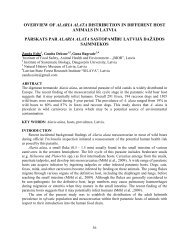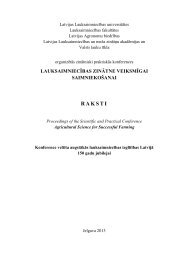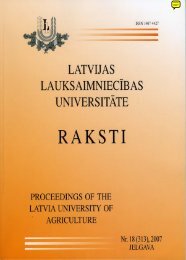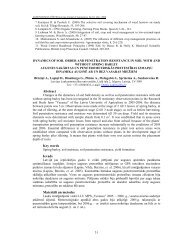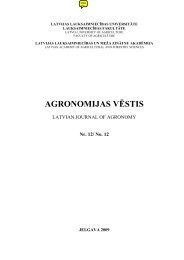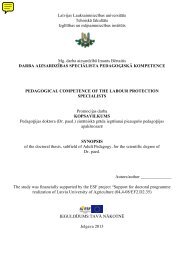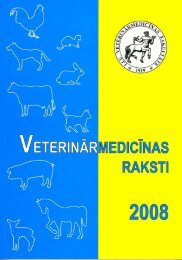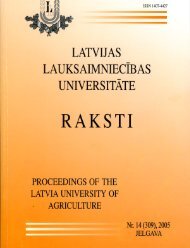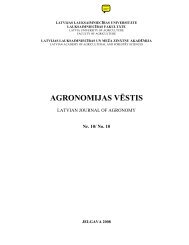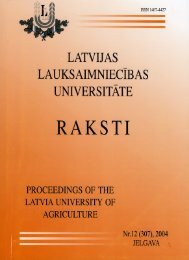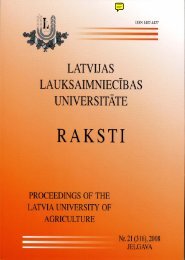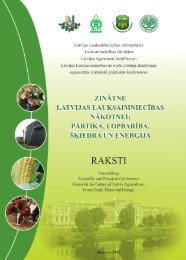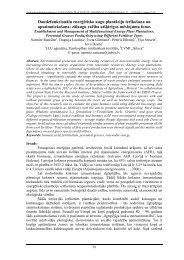Latvia University of Agriculture - Latvijas Lauksaimniecības ...
Latvia University of Agriculture - Latvijas Lauksaimniecības ...
Latvia University of Agriculture - Latvijas Lauksaimniecības ...
You also want an ePaper? Increase the reach of your titles
YUMPU automatically turns print PDFs into web optimized ePapers that Google loves.
A. Jansons et al. Research Institute <strong>of</strong> <strong>Agriculture</strong>: Research Activities <strong>of</strong> Last Decades 1990-2009Research Institute <strong>of</strong> <strong>Agriculture</strong>: Scientific Activities<strong>of</strong> Last Decades 1990-2009A. Jansons, J. Vigovskis, B. Jansone, A. ŠvartaResearch Institute <strong>of</strong> <strong>Agriculture</strong>Abstract. <strong>Latvia</strong> <strong>University</strong> <strong>of</strong> <strong>Agriculture</strong> Agency “Research Institute <strong>of</strong> <strong>Agriculture</strong>”in Skrīveri is the only place in <strong>Latvia</strong> where breeding <strong>of</strong> perennial grasses (both forconventional and organic agriculture needs) is performed, and cold resistant, productiveand illness-resistant perennial varieties are introduced. In the course <strong>of</strong> recent years,producers have been <strong>of</strong>fered new varieties <strong>of</strong> tetraploide red clover and alsike clover, andperennial grasses as well. The Institute scientists are engaged in production <strong>of</strong> selectiveperennial grass seeds; they uphold and study collection <strong>of</strong> genetic resources, arrangeexpeditions with the aim to collect the gene pool, and carry out economic evaluation<strong>of</strong> varieties, and check them, both within conventional and organic agriculture, assessdifference, uniformity and stability among cultivated plants that will be included intothe European Catalogue. The trial fields <strong>of</strong> Research Institute <strong>of</strong> <strong>Agriculture</strong> <strong>of</strong>fer manypractical ideas and ascertain the correct implementation <strong>of</strong> theory into the conditions <strong>of</strong>production: however, the Institute runs 117 ha <strong>of</strong> state land <strong>of</strong> which 43 ha are certifiedfor the organic agriculture, in addition taking on lease 50-60 ha more.Key words: Research Institute <strong>of</strong> <strong>Agriculture</strong>, breeding <strong>of</strong> perennial grasses,development.IntroductionThe history wheel relentlessly goes round changing generations and leaving behindnumerous historic events, national changes, and completed and uncompleted works.The last, nearly twenty years have brought many changes both into national and theAgricultural Institute’s life.The principal activity directions <strong>of</strong> the Agricultural Research Institute during last20 years were:– scientific activities dealing with fundamental and constructive research within thefield <strong>of</strong> agricultural sciences;– selection <strong>of</strong> perennial grasses, the variety sustaining seed farming, and sale <strong>of</strong>variety seeds;– maintenance <strong>of</strong> the national genetic resources, annually organizing expeditions andgathering perennial grasses <strong>of</strong> natural varieties, <strong>of</strong>fering the collected material tothe <strong>Latvia</strong>n Gene Bank, and making research and describing these varieties;– participation in educational work within higher education and doctoral study programsorganized by the LLU Faculty <strong>of</strong> <strong>Agriculture</strong>;– farmer, consultant and other agricultural specialist training, popularisation <strong>of</strong>scientific conclusions and research results;– organic farming;– <strong>of</strong>fering the laboratorial and advisory service.During this period we have entered the new 21 st century. Slowly and implacable a newscientist generation replaces the old one lifting on the top new men who think progressivelyaccording to modern demands. New information technologies, mechanization, plantgrowing and selection methods enter our life and alter our thinking. Only crops remainthe same, we grow them in order to bake our daily bread, to put something into the feedbunks <strong>of</strong> our cattle, to get milk.Thanks to the reinstatement <strong>of</strong> independent <strong>Latvia</strong> and transition from a centralizedmanagement system to a market orientated economy, the state funds to researchinstitutes have rapidly diminished, the land and production equipment were privatisedimplacably leading to narrowing <strong>of</strong> research work and decrease <strong>of</strong> scientist staff. Duringthe years 1986- 1996 from the Institute lost Selection and Experimental stations, thehousing facilities and public utilities went to the municipality, and more than threetimes has decreased the number <strong>of</strong> the Institute staff. The ten years brought to theAgricultural Institute quantitative changes and were concluded by the 50th anniversary<strong>of</strong> the Institute in 1996.<strong>Latvia</strong> <strong>University</strong> <strong>of</strong> <strong>Agriculture</strong> – 70, 2009 121



